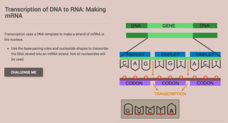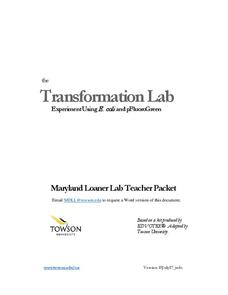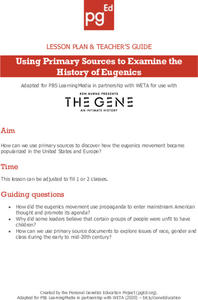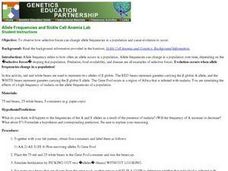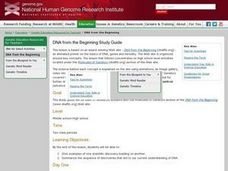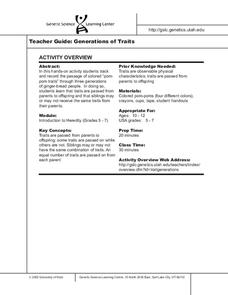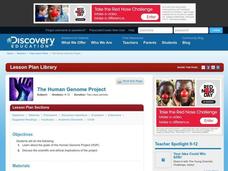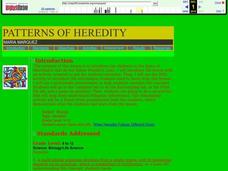National Association of Biology Teachers
Using the Discovery of the Structure of DNA to Illustrate Cultural Aspects of Science
Times have changed—and so have science practices. An introductory lesson describing the components of DNA begins with a discussion of the discovery of DNA and its perception in different cultures and genders. Scholars then learn about...
CK-12 Foundation
Transcription of DNA to RNA: Making mRNA
Transcription means a written copy but how can DNA write a message? The video explains transcription and translation as they relate to DNA and RNA. Then in the interactive, scholars practice base pairing and answer analysis questions...
Towson University
Transformation Lab
Transform your class' understanding of genes and antibiotic resistance with the Transformation Lab. Junior geneticists create and observe their own resistant strains of E. coli through research, discussion, and experimentation. The...
Kenan Fellows
Unit 2: DNA Analysis
Ever wonder how they solve those mysterious murders in TV crime dramas? The second of four units in a Biotechnology series introduces scholars to the many methods of DNA analysis. Pupils create and run their own gel electrophoresis...
Personal Genetics Education Project
Using Primary Sources to Examine the History of Eugenics
Eugenics philosophy takes survival of the fittest to a whole new level. With a research-focused lesson, young scientists examine the history of the eugenics movement and its impact on society. Pupils engage with a video clip, primary...
Curated OER
Allele Frequencies and Sickle Cell Anemia Lab
Students investigate how selective forces like food, predation and diseases affect evolution. In this genetics lesson, students use red and white beans to simulate the effect of malaria on allele frequencies. They analyze data collected...
Curated OER
DNA from the Beginning Study Guide
Students complete a study guide using a website which is an animated primer on DNA, genes, and heredity. The Web site is organized around key concepts. The web links and study guide are included.
Curated OER
TE Lesson: What's Dominant?
Students study the number of chromosomes in the body cells, sperm cells, and egg cells of humans. They define allele, and examine the difference between dominant and recessive alleles. They complete an activity with jelly beans that...
Curated OER
Gene Action/Mutation Worksheet
Students define the following terms: mutation, mutagen and give examples of how they work. They also define and illustrate a point mutation. Students define and illustrate a frame shift mutation and name two types of frame shift...
Curated OER
Generations of Traits
In this biology worksheet, students track and record the passage of colored pom pom traits through three generations of ginger-bread people. Then they describe that traits are passed from parents to offspring and that siblings may or may...
Curated OER
Inheritance Patterns in Zorks
In this inheritance patterns worksheet, students create a visual of a Zork using chromosome strips to represent alleles from the father and the mother to determine the traits in the offspring. Students translate the genotype to the...
Curated OER
Introducing Ideas about Inheritance
Is it nature or nurture? In an easily adaptable kinesthetic activity to introduce genetics, learners group themselves based on a variety of categories. They will quickly find that some characteristics are easy to put in order, while...
Curated OER
Geneticist for a Day
Young scholars discuss and compose a document discussing the transmission of the Huntington's gene- dominant or recessive, sex linked, etc. Additionally, they ought to consider Dr. Wexler's own odds for contracting the disease.
Curated OER
How Does Evolution Work?
Students investigate how natural selection influences evolution. They complete a hands-on lab simulation of natural selection, and replicate a real experiment and examine the interplay between selection factors in a population of guppies.
Curated OER
Human Genome Project
Students examine the goals of the Human Genome Project. They research issues of the project such as scientific, potential and ethical implications of the project. In addition, they create a presentation to present their findings.
Curated OER
Hardy-Weinberg Equilibrium
High schoolers investigate how Hardy-Weinberg Equilibrium is established and what assumptions and conditions are necessary to reach Equilibrium. They model alleles using materials such as index cards, M & M's and goldfish.
Curated OER
Patterns of Heredity
Students describe the differences between incomplete dominance and codominant alleles, and between multiple alleles and polygenic inheritance. They describe how internal and external environments affect gene expression. They then...
Curated OER
Taster or Non-Taster?
Learners conduct a simple experiment to determine if a trait has been passed from a family member to them.
Curated OER
Clipbirds
Students attempt to pick up various objects with a wide variety of beaks, including scissors, spoons, etc.
Curated OER
Identifying Disease Genes using BLAST
Students navigate the National Center for Biological Information (NCBI) website and BLAST program to conduct a variety of biological assignments.
Curated OER
Teaching About Inherited Human Disorders Through Case Studies
Students explore case studies involving human disorders. They identify options and consequences of each decision. Students interview a family member with a disorder. They create a presentation of their interview.
Curated OER
The Bottom Line
Seventh graders assume the role of stockholders in a fictitious biotech company. After investigating the cloning of pets, the effects of cloning on the health and well being of the cloned animal, and the ethical issues involved, groups...
Curated OER
Mental Illness: Could It Happen to Me?
Students investigate the effects of depression and the brain's influence on metal illness. The factors that may affect a person's ability to develop depression are examined in this lesson.
Curated OER
Designing Babies
Students analyze current and emerging techniques used to select specific characteristics in offspring. They examine specific case studies and make ethical decisions based upon the Ethical Decision-Making Model.
Other popular searches
- Genetic Engineering
- Genetic Diseases
- Population Genetics
- Genetics Worksheets
- Mendelian Genetics
- Genetics Middle School
- Genetics Probability
- Genetic Traits
- Genetics & Punnett Squares
- Genetics and Heredity
- Genetic Mutations
- Genetic Drift



